Page 680 of 777
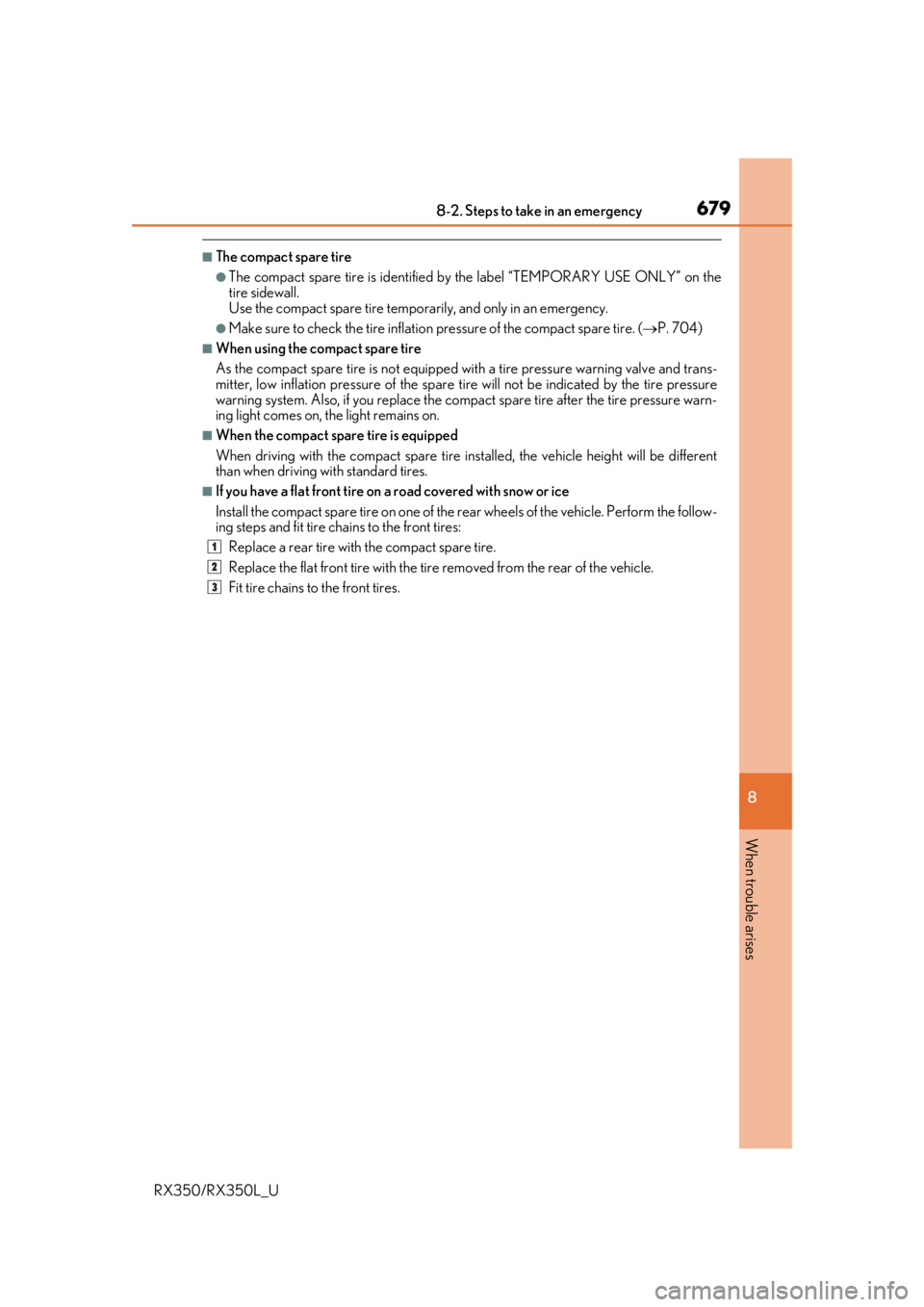
6798-2. Steps to take in an emergency
8
When trouble arises
RX350/RX350L_U
■The compact spare tire
●The compact spare tire is identified by the label “TEMPORARY USE ONLY” on the
tire sidewall.
Use the compact spare tire temporarily, and only in an emergency.
●Make sure to check the tire inflation pressure of the compact spare tire. (P. 704)
■When using the compact spare tire
As the compact spare tire is not equipped wi th a tire pressure warning valve and trans-
mitter, low inflation pressure of the spare tire will not be indicated by the tire pressure
warning system. Also, if you replace the compact spare tire after the tire pressure warn-
ing light comes on, the light remains on.
■When the compact spare tire is equipped
When driving with the compact spare tire inst alled, the vehicle height will be different
than when driving with standard tires.
■If you have a flat front tire on a road covered with snow or ice
Install the compact spare tire on one of the rear wheels of the vehicle. Perform the follow-
ing steps and fit tire chains to the front tires: Replace a rear tire with the compact spare tire.
Replace the flat front tire with the tire removed from the rear of the vehicle.
Fit tire chains to the front tires.
1
2
3
Page 682 of 777
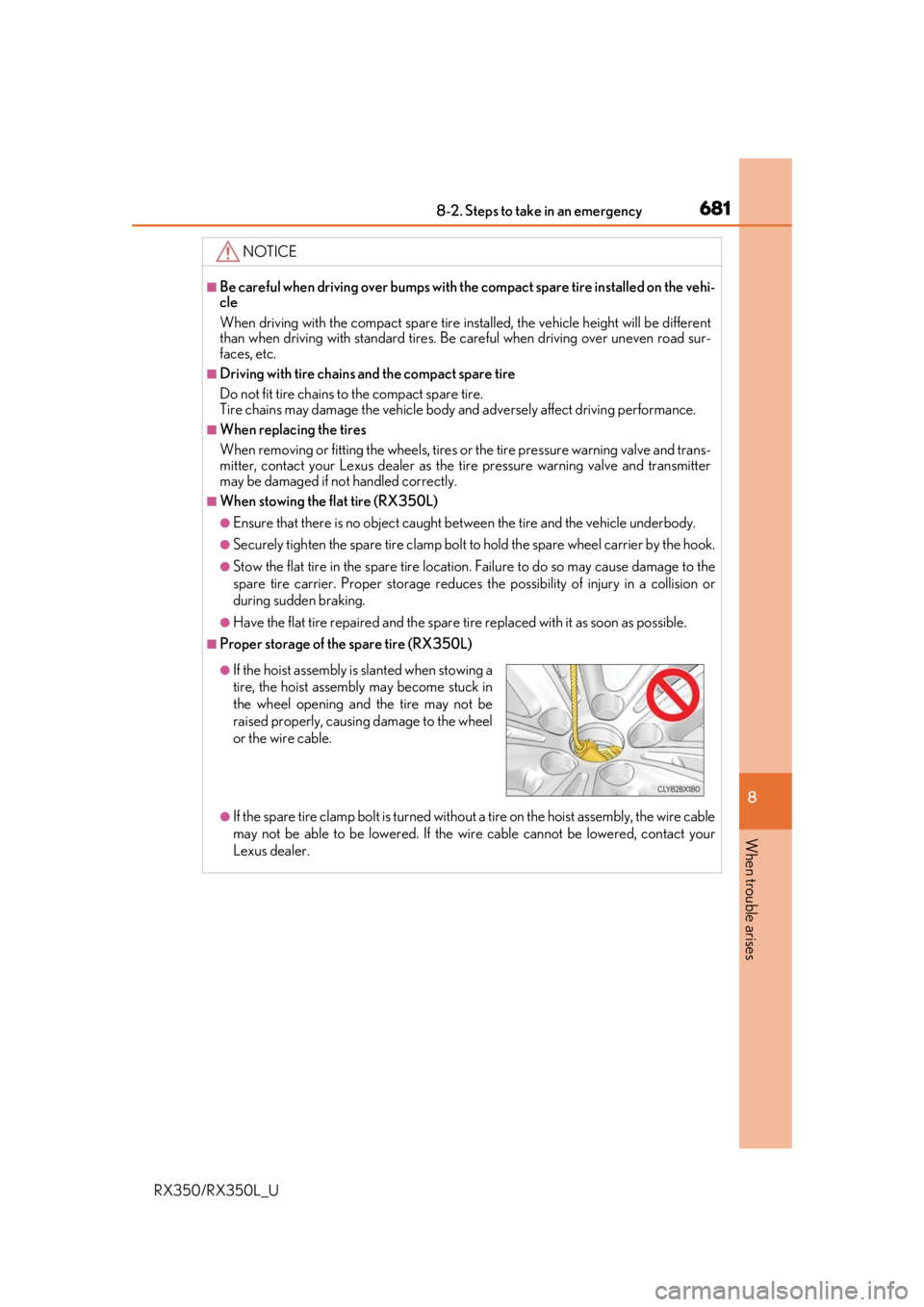
6818-2. Steps to take in an emergency
8
When trouble arises
RX350/RX350L_U
NOTICE
■Be careful when driving over bumps with the compact spare tire installed on the vehi-
cle
When driving with the compact spare tire installed, the vehicle height will be different
than when driving with standard tires. Be careful when driving over uneven road sur-
faces, etc.
■Driving with tire chains and the compact spare tire
Do not fit tire chains to the compact spare tire.
Tire chains may damage the vehicle body and adversely affect driving performance.
■When replacing the tires
When removing or fitting the wheels, tires or the tire pressure warning valve and trans-
mitter, contact your Lexus dealer as the tire pressure warning valve and transmitter
may be damaged if not handled correctly.
■When stowing the flat tire (RX350L)
●Ensure that there is no object caught between the tire and the vehicle underbody.
●Securely tighten the spare tire clamp bolt to hold the spare wheel carrier by the hook.
●Stow the flat tire in the spare tire location. Failure to do so may cause damage to the
spare tire carrier. Proper storage reduces the possibilit y of injury in a collision or
during sudden braking.
●Have the flat tire repaired and the spare tire replaced with it as soon as possible.
■Proper storage of the spare tire (RX350L)
●If the spare tire clamp bolt is turned withou t a tire on the hoist assembly, the wire cable
may not be able to be lowered. If the wire cable cannot be lowered, contact your
Lexus dealer.
●If the hoist assembly is slanted when stowing a
tire, the hoist assembly may become stuck in
the wheel opening and the tire may not be
raised properly, causing damage to the wheel
or the wire cable.
Page 705 of 777
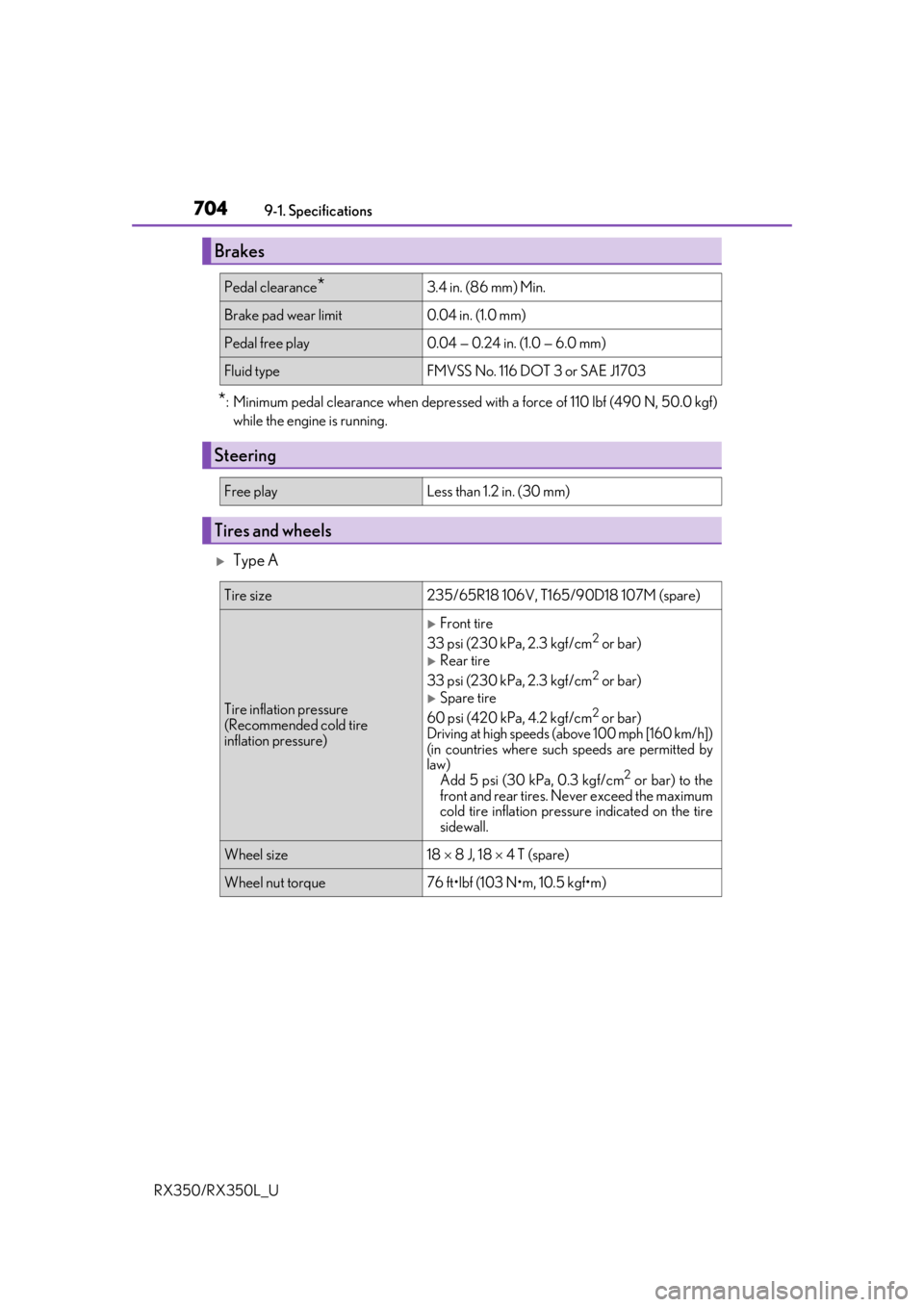
7049-1. Specifications
RX350/RX350L_U
*: Minimum pedal clearance when depressed wi th a force of 110 lbf (490 N, 50.0 kgf)
while the engine is running.
Type A
Brakes
Pedal clearance*3.4 in. (86 mm) Min.
Brake pad wear limit0.04 in. (1.0 mm)
Pedal free play0.04 — 0.24 in. (1.0 — 6.0 mm)
Fluid typeFMVSS No. 116 DOT 3 or SAE J1703
Steering
Free playLess than 1.2 in. (30 mm)
Tires and wheels
Tire size235/65R18 106V, T165/90D18 107M (spare)
Tire inflation pressure
(Recommended cold tire
inflation pressure)
Front tire
33 psi (230 kPa, 2.3 kgf/cm2 or bar)
Rear tire
33 psi (230 kPa, 2.3 kgf/cm2 or bar)
Spare tire
60 psi (420 kPa, 4.2 kgf/cm2 or bar)
Driving at high speeds (above 100 mph [160 km/h])
(in countries where such speeds are permitted by
law)
Add 5 psi (30 kPa, 0.3 kgf/cm2 or bar) to the
front and rear tires. Never exceed the maximum
cold tire inflation pressu re indicated on the tire
sidewall.
Wheel size18 8 J, 18 4 T (spare)
Wheel nut torque76 ft•lbf (103 N•m, 10.5 kgf•m)
Page 706 of 777
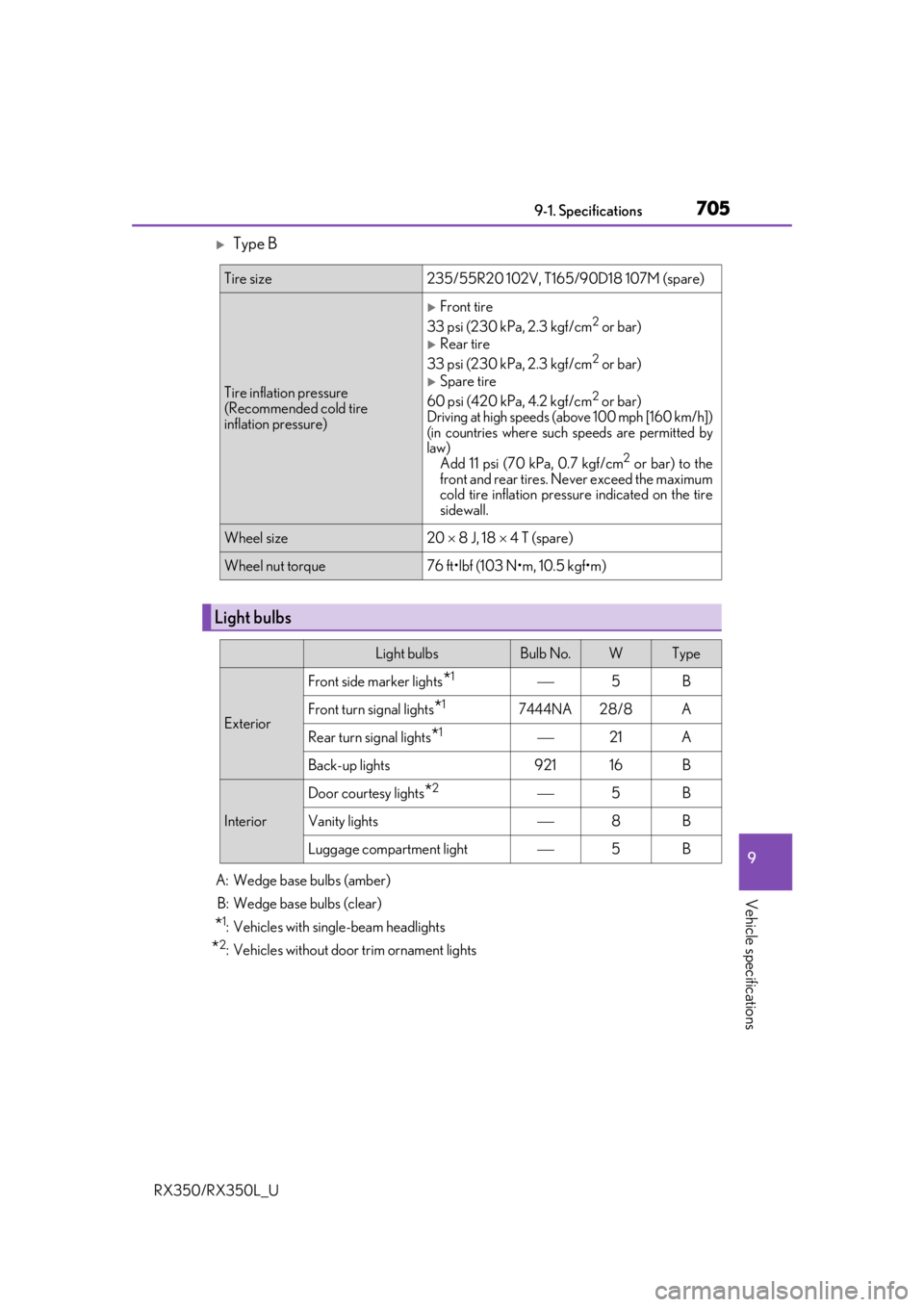
7059-1. Specifications
9
Vehicle specifications
RX350/RX350L_U
Type B
A: Wedge base bulbs (amber)B: Wedge base bulbs (clear)
*1: Vehicles with single-beam headlights
*2: Vehicles without door trim ornament lights
Tire size235/55R20 102V, T165/90D18 107M (spare)
Tire inflation pressure
(Recommended cold tire
inflation pressure)
Front tire
33 psi (230 kPa, 2.3 kgf/cm2 or bar)
Rear tire
33 psi (230 kPa, 2.3 kgf/cm2 or bar)
Spare tire
60 psi (420 kPa, 4.2 kgf/cm2 or bar)
Driving at high speeds (above 100 mph [160 km/h])
(in countries where such speeds are permitted by
law)
Add 11 psi (70 kPa, 0.7 kgf/cm2 or bar) to the
front and rear tires. Never exceed the maximum
cold tire inflation pressu re indicated on the tire
sidewall.
Wheel size20 8 J, 18 4 T (spare)
Wheel nut torque76 ft•lbf (103 N•m, 10.5 kgf•m)
Light bulbs
Light bulbsBulb No.WType
Exterior
Front side marker lights*15B
Front turn signal lights*17444NA28/8A
Rear turn signal lights*121A
Back-up lights921 16B
Interior
Door courtesy lights*25B
Vanity lights8B
Luggage compartment light5B
Page 711 of 777

7109-1. Specifications
RX350/RX350L_U
Tire size ( P. 712)
DOT and Tire Identification Number (TIN) ( P. 711)
Location of treadwear indicators (P. 604)
Tire ply composition and materials
Plies are layers of rubber-c oated parallel cords. Cords are the strands which form the
plies in a tire.
Radial tires or bias-ply tires
A radial tire has “RADIAL” on the sidewall. A tire not marked “RADIAL” is a bias-ply
tire.
TUBELESS or TUBE TYPE
A tubeless tire does not have a tube and air is directly put into the tire. A tube type tire
has a tube inside the tire and the tube maintains the air pressure.
Load limit at maximum cold tire inflation pressure ( P. 608)
Maximum cold tire inflation pressure ( P. 704)
This means the pressure to which a tire may be inflated.
Uniform tire quality grading
For details, see “Uniform Tire Quality Grading” that follows.
Summer tires or all season tires ( P. 608)
An all season tire has “M+S” on the side wall. A tire not marked “M+S” is a summer
tire.
“TEMPORARY USE ONLY”
A compact spare tire is identified by the phrase “TEMPORARY USE ONLY” molded
on its sidewall. This tire is designed for temporary emergency use only.
1
2
3
4
5
6
7
8
9
10
11
Page 716 of 777
7159-1. Specifications
9
Vehicle specifications
RX350/RX350L_U
■Temperature A, B, C
The temperature grades are A (the highest), B, and C, representing the tire’s
resistance to the generation of heat and its ability to dissipate heat when
tested under controlled conditions on a specified indoor laboratory test
wheel.
Sustained high temperature can cause the ma terial of the tire to degenerate and
reduce tire life, and excessive temperature can lead to sudden tire failure.
Grade C corresponds to a level of perfor mance which all passenger car tires must
meet under the Federal Motor Vehicle Safety Standard No. 109.
Grades B and A represent higher levels of performance on the laboratory test
wheel than the minimum required by law.
Warning: The temperature grades of a tire assume that it is properly inflated and
not overloaded.
Excessive speed, underi nflation, or excessive loading, either separately or in com-
bination, can cause heat buildup and possible tire failure.
Page 717 of 777
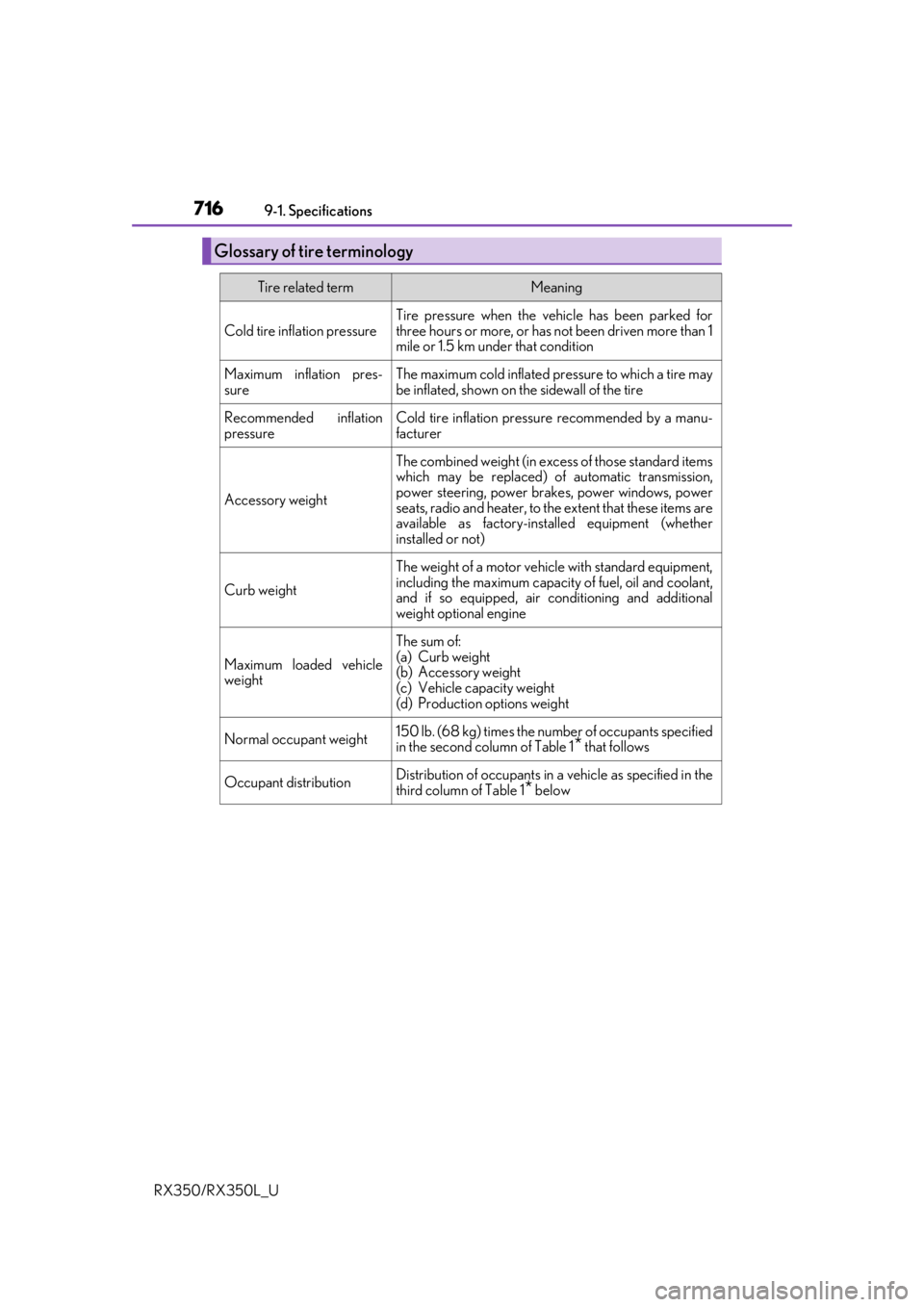
7169-1. Specifications
RX350/RX350L_U
Glossary of tire terminology
Tire related termMeaning
Cold tire inflation pressure
Tire pressure when the vehicle has been parked for
three hours or more, or has no t been driven more than 1
mile or 1.5 km un der that condition
Maximum inflation pres-
sureThe maximum cold inflated pr essure to which a tire may
be inflated, shown on the sidewall of the tire
Recommended inflation
pressureCold tire inflation pressure recommended by a manu-
facturer
Accessory weight
The combined weight (in exce ss of those standard items
which may be replaced) of automatic transmission,
power steering, power brakes, power windows, power
seats, radio and heater, to the extent that these items are
available as factory-installed equipment (whether
installed or not)
Curb weight
The weight of a motor vehicle with standard equipment,
including the maximum capacity of fuel, oil and coolant,
and if so equipped, air co nditioning and additional
weight optional engine
Maximum loaded vehicle
weight
The sum of:
(a) Curb weight
(b) Accessory weight
(c) Vehicle capacity weight
(d) Production options weight
Normal occupant weight150 lb. (68 kg) times the numb er of occupants specified
in the second column of Table 1* that follows
Occupant distributionDistribution of occupants in a vehicle as specified in the
third column of Table 1
* below
Page 718 of 777
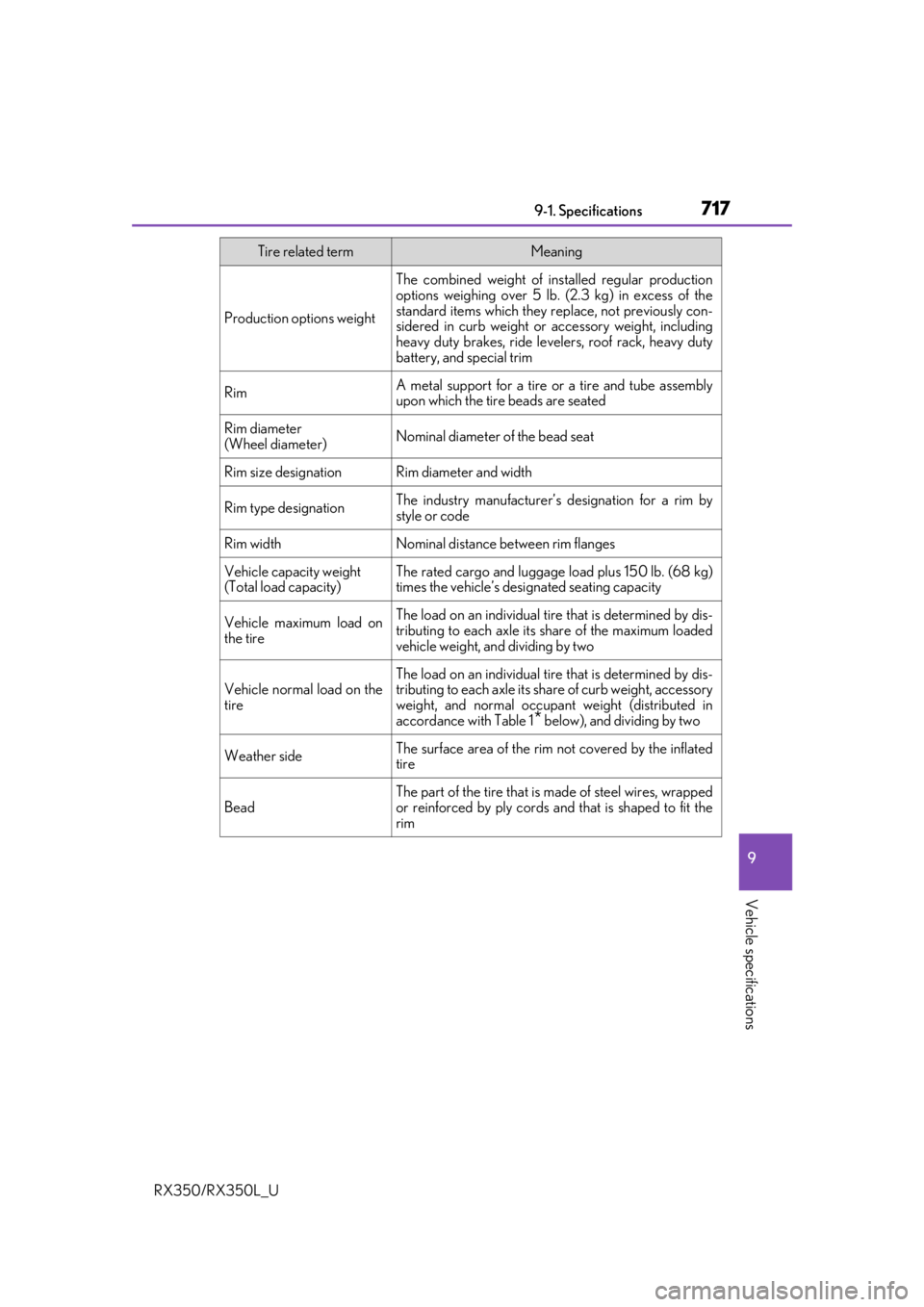
7179-1. Specifications
9
Vehicle specifications
RX350/RX350L_U
Production options weight
The combined weight of installed regular production
options weighing over 5 lb. (2.3 kg) in excess of the
standard items which they re place, not previously con-
sidered in curb weight or accessory weight, including
heavy duty brakes, ride levelers, roof rack, heavy duty
battery, and special trim
RimA metal support for a tire or a tire and tube assembly
upon which the tire beads are seated
Rim diameter
(Wheel diameter)Nominal diameter of the bead seat
Rim size designationRim diameter and width
Rim type designationThe industry manufacturer’s designation for a rim by
style or code
Rim widthNominal distance between rim flanges
Vehicle capacity weight
(Total load capacity)The rated cargo and luggage load plus 150 lb. (68 kg)
times the vehicle’s desi gnated seating capacity
Vehicle maximum load on
the tireThe load on an individual tire that is determined by dis-
tributing to each axle its share of the maximum loaded
vehicle weight, and dividing by two
Vehicle normal load on the
tire
The load on an individual tire that is determined by dis-
tributing to each axle its sh are of curb weight, accessory
weight, and normal occupant weight (distributed in
accordance with Table 1
* below), and dividing by two
Weather sideThe surface area of the rim not covered by the inflated
tire
BeadThe part of the tire that is made of steel wires, wrapped
or reinforced by ply cords an d that is shaped to fit the
rim
Tire related termMeaning